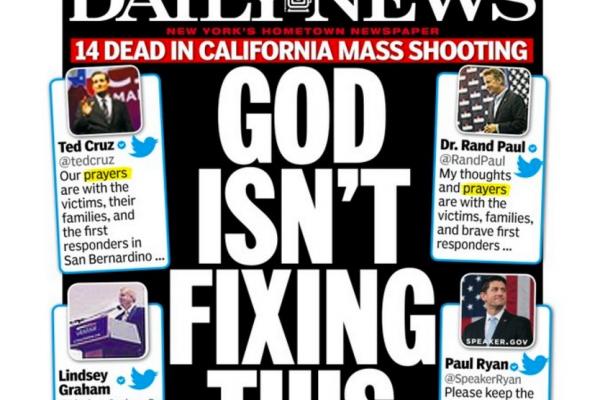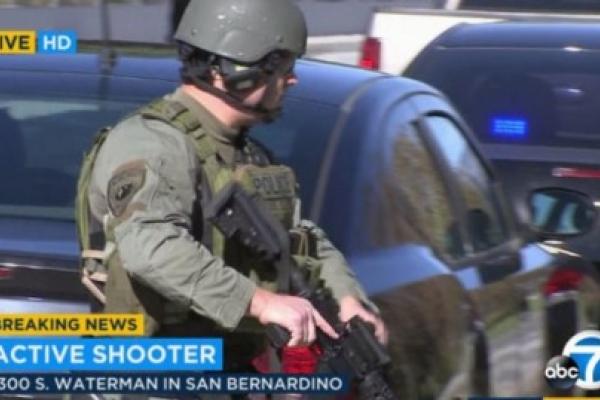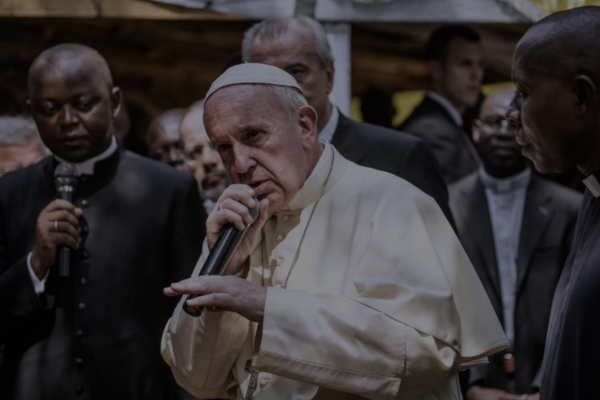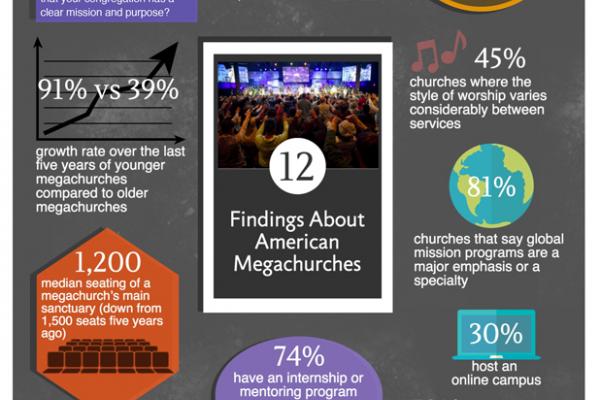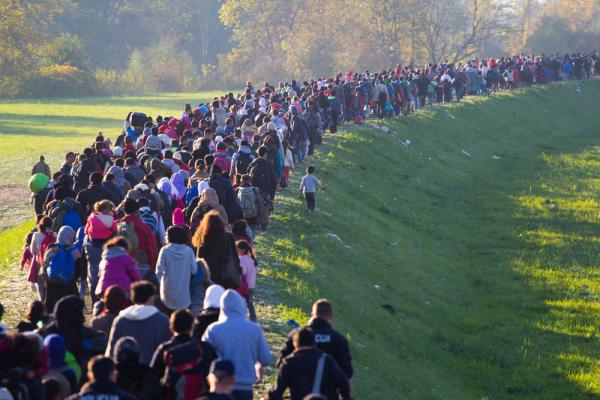The front cover of the New York Daily News for Dec. 3 takes a strong stance against how some politicians are reacting to the San Bernardino shooting with calls for prayer instead of tighter gun control laws.
The headline says, “God Isn’t Fixing This.”
“As latest batch of innocent Americans are left lying in pools of blood, cowards who could truly end gun scourge continue to hide behind meaningless platitudes,” the cover reads.
The mass shooting in San Bernardino is the 3rd worst mass killing since 1992, just after Virginia Tech and Sandy Hook. This epidemic must end.
But unfortunately, too many of our political leaders are simply lifting up their "thoughts and prayers." Such platitudes may be nice, but what we really need is for politicians to do their job. We had only just begun talking and writing about motives for the last mass shooting when we had to stop and watch today's unfold. There have been 355 mass shootings in 336 days. Thoughts and prayers for victims and families are empty sentiments when you have to say it every day.
San Bernardino Fire Department reports that local emergency units are responding to reports of a 20 victim shooting incident in south San Bernardino, Calif. The status of the victims is unclear.
The San Bernardino Police Department reports the shooter is still active, and that they have identified 1-3 suspects.
The intellectual in exile is someone who completely removes him or herself from a society, culture, belief, or way of thinking in order to fully examine it. Said says that exile is the only complete way to get an understanding of how something runs.
As long as you are a part of the machine, in other words, you are blind to some of its constructive, and destructive, features.
The intellectual in exile does not need to remove him or herself from a popular city. You can be an intellectual in exile in any major cities around the country. What’s required instead is to remove yourself from your typical thought process. Challenge things.
The intellectual in exile is happy being uncomfortable. This constant struggle encourages them to constantly develop, and not ever settle for what is easy or popular.
Yet it is still important to keep yourself in good community. Said also said, “No one is totally self-supporting, not even the greatest of free spirits.”
I remain deeply disturbed by the visual of the small, black girl being tossed across the classroom by a “man” in a police uniform. Intellectually, I am aware that what appears to be an act of senseless violence is yet another contribution to a mountain of overwhelming evidence that black lives do not matter in our society. But I also know Ben as a loving human being, filled with a deep sense of compassion and justice. How do I reconcile the two?
I must step back and look more closely at the roots of his behavior. What led him to such force? Was it a trained response? Was there a personal antecedent? … Does it matter?
On the occasion of Martin Luther King’s assassination, Robert Kennedy spoke to an audience of black people in Indianapolis — one of the few major cities not to erupt in violence. Kennedy implored the audience to not react in anger at the “awful grace of God.” My friend Ben Fields is currently caught up in such a moment and I would like to help him navigate the treacherous waters where he has suddenly found himself.
The British Parliament voted Dec. 2 to begin a bombing campaign in Syria in order to disrupt ISIS.
The vote took place after a contentious ten-hour debate in the House of Commons. Prime Minister David Cameron’s comments that those opposed to the bombing campaign are “terrorist sympathisers” hung in the background of the debate.
Anyone who’s ever read Pope Francis’ writings knows his flair for lyricism. Take the following passage from his “Laudato Si’”:
“Through our worship of God, we are invited to embrace the world on a different plane. Water, oil, fire, and colors are taken up in all their symbolic power and incorporated in our act of praise.”
This week, the Internet decided to help the Holy Father with his lyrics, just in case he ever decides to drop a rap album (and honestly, who knows with Pope Francis? He’s full of surprises. He did release a prog-rock album recently — truly.)
The inspiration for the Internet’s collective creativity was the below picture, in which Pope Francis looks like he’s about to spit holy fire.
Change is coming to American megachurches — those behemoths for believers that now dot the religious landscape.
There are more participants in megachurch worship than ever.
“Last weekend 1 in 10 adults and children who went to a Protestant church went to a megachurch — about 5 million people,” said Warren Bird, director of research for Leadership Network and co-author of a megachurch study released Dec. 2.
But individual attendance is down to once or twice a month — or less.
The French government has banned mass gatherings during COP21 in Paris. So protesters have gotten creative.
The organization Brandalism has posted 600 pieces of artwork and fake advertisements all over the city that mimic real advertisements but actually denounce politicians and corporations for their apathy toward climate change.
Faith-based agencies that resettle refugees in America stand to gain more than a clear conscience if the United States — after what is expected to be a fierce debate in Congress — accepts a proposed 10,000 Syrian refugees next year.
More refugees also means more revenue for the agencies’ little-known debt collection operations, which bring in upwards of $5 million a year in commissions as resettled refugees repay loans for their travel costs. All nine resettlement agencies charge the same going rate as private-sector debt collectors: 25 percent of all they recoup for the government.
This debt collection practice is coming under increased scrutiny as agencies occupy a growing stage in the public square, where they argue America has a moral obligation to resettle thousands of at-risk Syrian refugees. Some observers say the call to moral action rings hollow when these agencies stand to benefit financially.
